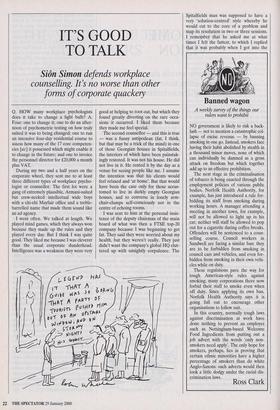Banned wagon
A weekly survey of the things our rulers want to prohibit
NO government is likely to risk a back- lash — not to mention a catastrophic col- lapse of excise revenue — by banning smoking in one go. Instead, smokers face having their habit abolished by stealth in a thousand minor moves, none of which can individually be damned as a gross attack on freedom but which together add up to an effective prohibition.
The next stage in the criminalisation of tobacco is being enacted through the employment policies of various public bodies. Norfolk Health Authority, for example, has just introduced a rule for- bidding its staff from smoking during working hours. A manager attending a meeting in another town, for example, will not be allowed to light up in his car; neither will staff be allowed to pop out for a cigarette during coffee breaks. Offenders will be sentenced to a coun- selling course. Council workers in Sandwell are facing a similar ban: they are to be forbidden from smoking in council cars and vehicles, and even for- bidden from smoking in their own vehi- cles while on duty.
These regulations pave the way for tough American-style rules against smoking; many corporations there now forbid their staff to smoke even when off duty. Since applying its own ban, Norfolk Health Authority says it is going full out to encourage other organisations to follow suit.
In this country, normally tough laws against discrimination at work have done nothing to prevent an employer such as Nottingham-based Welcome Food Ingredients from putting out a job advert with the words 'only non- smokers need apply'. The only hope for smokers, perhaps, lies in proving that certain ethnic minorities have a higher percentage of smokers than do white Anglo-Saxons: such adverts would then look a little dodgy under the racial dis- crimination laws. Ross Clark


















































































 Previous page
Previous page